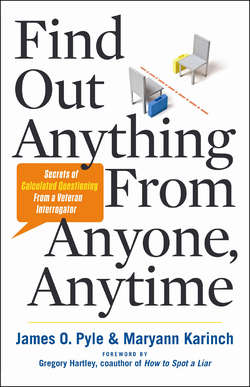Читать книгу Find Out Anything From Anyone, Anytime: Secrets of Calculated Questioning From a Veteran Interrogator - Pyle James - Страница 5
Introduction
What’s So Hard About Asking a Question?
ОглавлениеOn June 23, 2013, Nik Wallenda crossed a gorge near the Grand Canyon on a two-inch wire. With no tether or safety net, he made the quarter-mile walk 1,500 feet above the ground. Millions of people watched the televised feat with wide-eyed, childlike fascination. The stunt inspired a flurry of questions from viewers: What is he thinking? When did he start walking on wires? How does he feel? Where are his kids? Many questions popped up in the 700,000 Tweets about #skywire; consistent with the Twitter protocol, they were concise: “Why is he wearing jeans?” and “Why did his wife let him do this?”1
From my perspective, Nik Wallenda’s spectacular act stunned millions of people into becoming better questioners – at least for 22 minutes and 54 seconds, which is how long it took Wallenda to cross. The bursts of what, when, why, where, and how were the basis for a lot of well-structured, informative stories about the man and his achievement.
But complex news issues such as foreign relations, federal budgets, and trade deficits seem to invite us to ask more “sophisticated” questions – to stuff a few more syllables and concepts into our questions. For example, consider some of the questions journalists asked U.S. President Barack Obama at an April 30, 2013 press conference. The two opening questions, posed by the same person with no break allowing for an answer in between, were as follows:
On Syria, you said that the red line was not just about chemical weapons being used but being spread, and it was a game-changer. Do you risk U.S. credibility if you don’t take military action? And then on Benghazi, there are some survivors of that terror attack who say they want to come forward and testify…and they say they’ve been blocked. Will you allow them to testify?2
This pair was followed by a string of similarly flawed questions from multiple White House correspondents:
✗ By game-changer you mean U.S. military action?3
✗ Will you help them come forward and just say it once and for all?4
✗ A senior member of the Armed Services Committee has said that Benghazi and Boston are both examples of the U.S. going backwards on national security. Is he right? And did our intelligence miss something?5
✗ Are you getting all the intelligence and information you need from the Russians? And should Americans be worried when they go to big, public events now?6
✗ Do you still have the juice to get the rest of your agenda through this Congress?7
Note that this is the exact sequence of the questions. So in the first nine questions posed to the President – and this is about halfway into the press conference – what are the only words President Obama would have needed to answer each of these questions? “Yes” and “no.” He did not give yes-or-no answers, of course; he talked at length about the issues raised. This is why some people who watched the press conference may have concluded that the journalists did a marvelous job of drawing out information from the President. In reality, the journalists with substandard questions merely benefited from the fact that President Obama had a great many points he intended to make during the press conference.
1
Brooklyn Decker’s Twitter account, @ BrooklynDecker, 7:55 p.m., June 23, 2013.
2
Ed Henry, Fox News Chief White House Correspondent, April 30, 2012 Press Conference with President Barack Obama; www.politico.com/story/2013/04/obama-press-conference-syria-sequestration-transcript-video-90775.html#ixzz2XctIaijr.
3
Ibid.
4
Ibid.
5
Jessica Yellin, CNN Chief White House Correspondent, April 30, 2012 Press Conference with President Barack Obama; www.politico.com/story/2013/04/obama-press-conference-syria-sequestration-transcript-video-90775.html#ixzz2XctIaijr.
6
Ibid.
7
Jonathan Karl, ABC News Chief White House Correspondent, April 30, 2012 Press Conference with President Barack Obama; www.politico.com/story/2013/04/obama-press-conference-syria-sequestration-transcript-video-90775.html#ixzz2XctIaijr.
